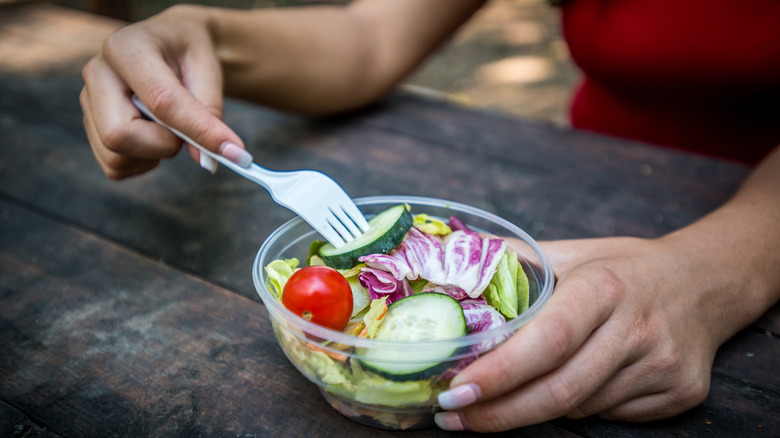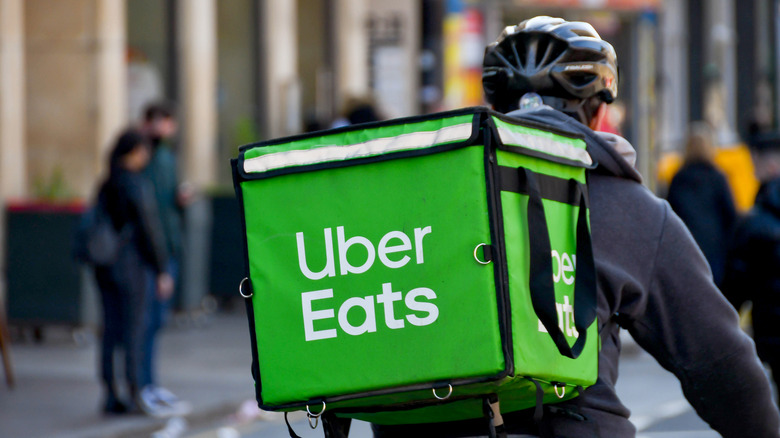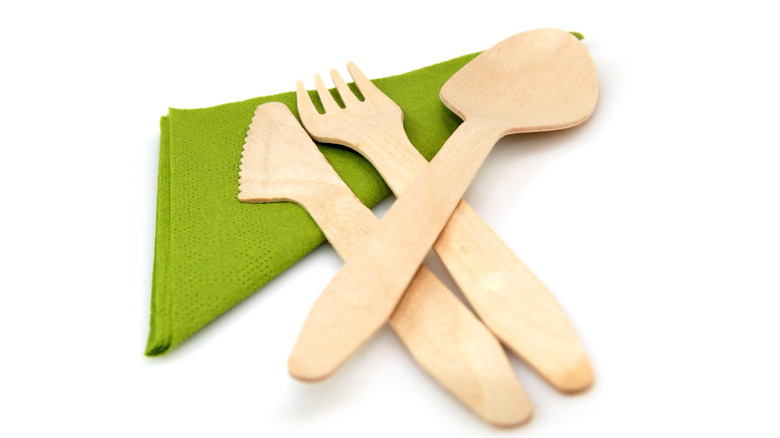The Plastic Utensil Etiquette To Know For Takeout Orders
So you're ordering takeout, and you've chosen something that needs cutlery: soup, salad, or maybe you're just an oddball who eats pizza with a knife and fork. While we're not judging your method for getting that pizza to your mouth, you may want to know: Is it okay to request plastic cutlery from the restaurant?
The short answer is that no, it's not ideal. Sure, you're not going to be canceled, exiled from modern society, and forced to live out your life on a desert island. But if you remember the fuss about plastic straws from a few years ago — where plastic straws were said to be killing turtles and generally polluting the environment — then plastic utensils fit into the same category.
Americans use a lot of plastic utensils: around 40 billion pieces each year. Since fossil fuels are used to make them, all those knives, forks, and spoons contribute to climate change — and if that's not a concern to you, they can also end up in your forests, beaches, and waterways where they take centuries to break down. It's for these reasons that there's a new piece of etiquette advice floating around: Avoid requesting plastic utensils with your food, if possible.
Of course, there are situations where getting plastic cutlery is unavoidable: If you're out and about in a park, or perhaps in an under-equipped office break room, you may have to use plastic utensils if you haven't brought your own. But if you're eating your meal at home or some other place where there's easy access to knives and forks (so, anywhere with a kitchen), single-use utensils aren't necessary.
Opt out if you can
If you're ordering your takeout or delivery via an app, you may be able to opt out of having utensils included with your meal. For example, DoorDash has this option in its app although only in certain cities (specifically Boulder, Los Angeles, Denver, Vancouver, and San Francisco). Often, it'll be up to the restaurant you're ordering from — but you can always use the "Instructions" or "Extra notes" box on your order to request no utensils.
If you're picking up your order, you can ask directly at the counter — or if they're already in the bag with your order, you can take them out and give them back — although this is only hygienic if the utensils are packaged in even more plastic. Restaurants will probably appreciate this, too: Even though a plastic knife and fork might only be worth a couple of cents, it'll save them money in the long run if most customers decline utensils.
Of course, if you're planning a big picnic or another type of get-together where people will be eating outside, plastic cutlery can be tempting — limited clean up and no net loss if people lose their utensils. Even so, whenever possible, it's just better (and nicer, frankly — have you tried spearing a hunk of grilled meat on plastic forks? Not easy!) to bring the real deal.
Are alternatives to plastic cutlery any better?
With all those environmental concerns, it's not uncommon to find a pair of wooden utensils slipped in with your takeout order, or even cutlery that seems like plastic but is actually plant-based (the industry term for these is "bioplastics"). These are generally better for the environment. Wooden utensils are much more sustainable than plastic: Producing them requires less than one percent of the water that's needed to make their plastic counterparts, and wood obviously breaks down far faster than plastic once thrown away.
Bioplastics are a bit more ambiguous: They're less carbon-intensive than traditional plastic and easier to compost. However, studies have given various reasons why bioplastics aren't quite a magic alternative to plastic — even if they're generally somewhat better. For example, it can take a lot of pesticides and fertilizers to grow the crops needed to produce bioplastics, and this can result in greater environmental degradation than regular plastic (at least in certain categories). They can also release the greenhouse gas methane as they biodegrade — though less than traditional plastic.
So if you're thinking of the environment as you order your takeout curry or pasta, wooden or other biodegradable utensils are better than plastic — but the ideal situation is still to use your own cutlery that can be washed and reused indefinitely.



